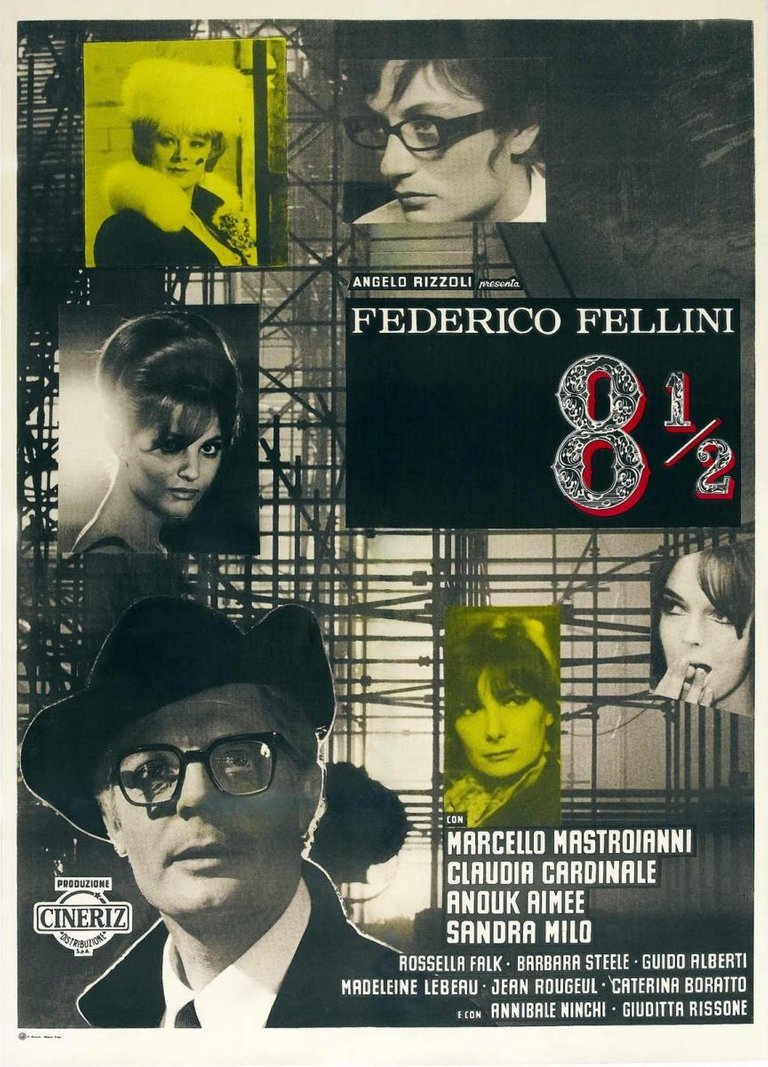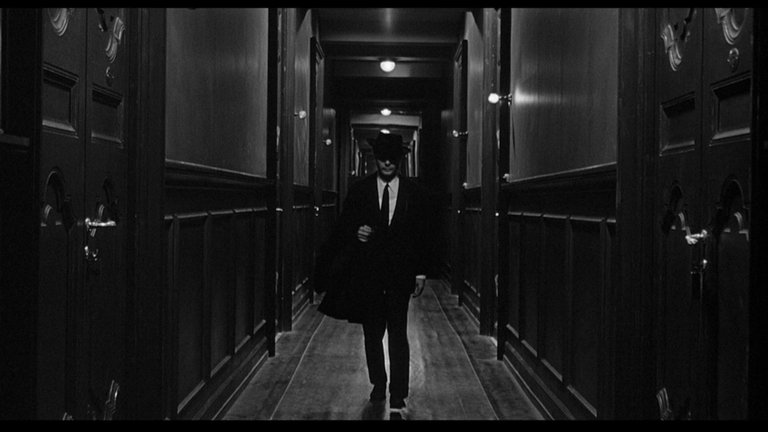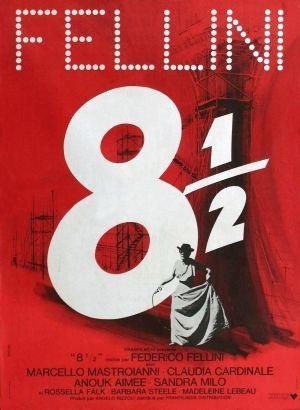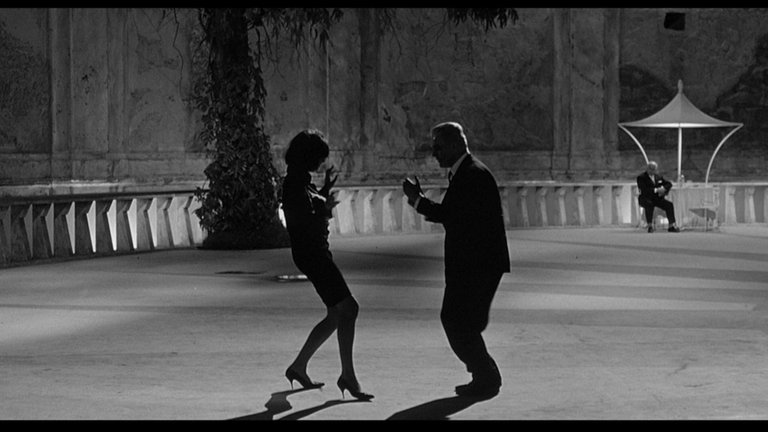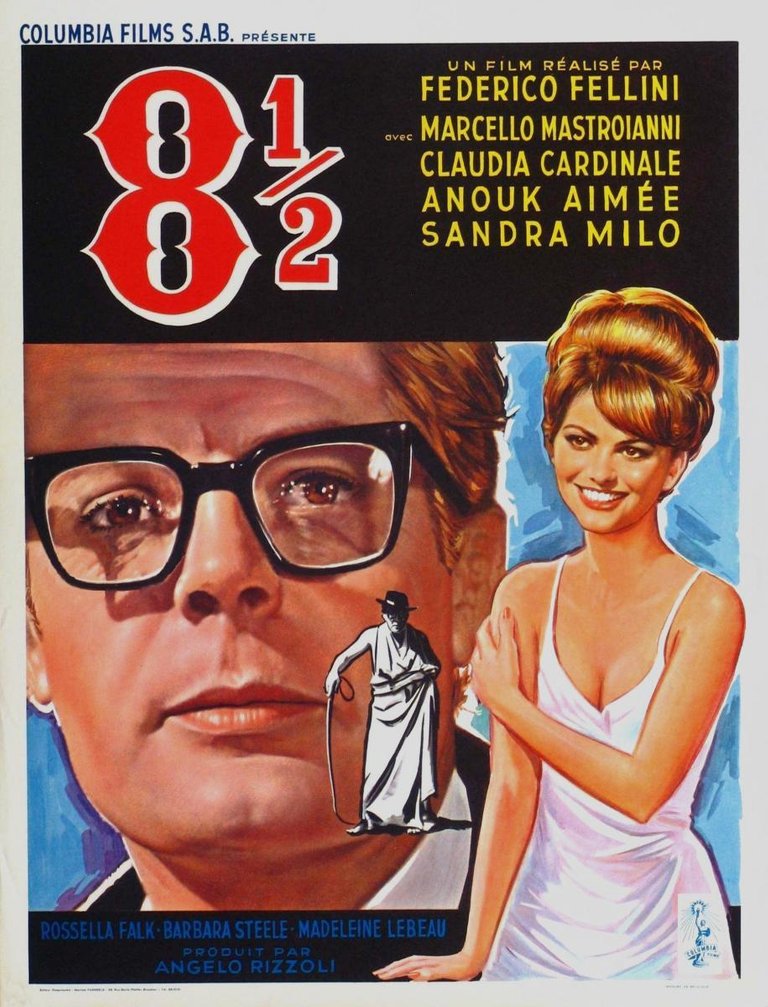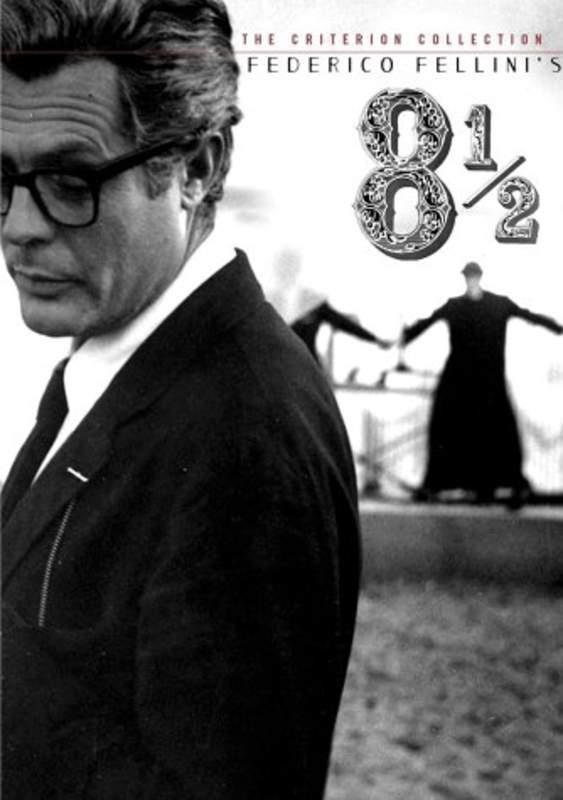8 1/2 (1963): a movie-within-a-movie classic | un clásico del cine dentro del cine
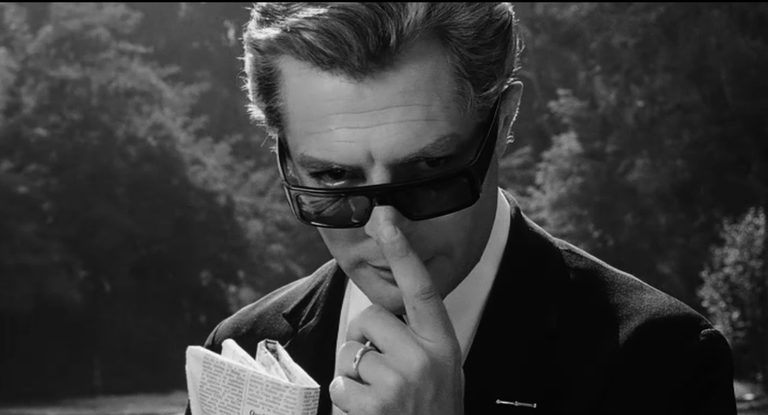
Una película de Federico Fellini
Some time ago - I don't know exactly how long - I saw this movie and I had the feeling that I had to see it again. Not because I had not understood it, but because I liked it a lot, but I sensed that some things had been overlooked. I don't know the reason for that feeling and the truth is that it's been so long since that first look that comparing the feeling now with that of then is very difficult. Now, the truth is that it's one of the best films I've seen from the old continent.
Hace algún tiempo - no sé exactamente cuánto - vi esta película y me quedó la sensación de que tenía que verla de nuevo. No porque no la hubiera entendido, sino porque me gustó mucho, pero intuí que algunas cosas se me habían pasado por alto. No sé el por qué de esa sensación y la verdad, hace tanto tiempo desde aquella primera mirada que comparar la sensación de ahora con la de entonces es muy difícil. Ahora bien, lo cierto es que es una de las mejores películas que he visto provenientes del viejo cotinente.
This film, which surely the most connoisseurs of the seventh art will have heard of, even seen, is one of the most iconic films by the Italian Director Federico Fellini, also creator of Amarcord and La Dolce Vita, references to Italian, European and world cinema.
8 1/2 tells the story of Guido, a film director who, after achieving a resounding success, goes through a crisis of creativity in the midst of another personal crisis and tries to make a new film while dealing with his internal struggles and the others fight against his indecision, his doubts and his changing mood. In the midst of this situation and surrounded by his producer, a critic, actresses, friends, acquaintances, a lover and other curious characters, Guido begins to review the most important events of his life and to remember all the women he has loved mixing not only time lines but also reality with fantasy. Memories, dreams, fantasies, nightmares, are the main ingredients of this story.
Esta película de la que seguramente los más conocedores del séptimo arte habrán oído hablar, incluso la habrán visto, es una de las películas más icónicas del Director Italiano Federico Fellini, creador también de Amarcord y La Dolce Vita, referencias del cine italiano, europeo y mundial.
8 1/2 cuenta la historia de Guido, un director de cine que después de obtener un éxito rotundo atraviesa una crisis de creatividad en medio de otra crisis personal e intenta hacer una nueva película mientras lidia con sus luchas internas y los demás luchan contra su indecisión, sus dudas y su ánimo cambiante. En medio de esta situación y rodeado de su productor, un crítico, actrices, amigos, conocidos, una amante y otros curiosos personajes, Guido empieza a pasar revista a los hechos más importantes de su vida y a recordar a todas las mujeres a las que ha amado mezclando no sólo las líneas temporales sino también la realidad con la fantasía. Recuerdos, sueños, fantasías, pesadillas, son los ingredientes principales de esta historia.
What we feel when we see 8 1/2 can be summed up very well in the sentence pronounced by a character about the film that Guido himself is making: "You see, a first reading makes plain the lack of a central idea that establishes the problematic of the film or, if you wish, of a philosophical premise and therefore the film becomes a series of absolutely gratuitous episodes. One wonders what the authors really intend. Do they want to make us think? Do they want to frighten us?"
Lo que sentimos al ver 8 1/2 se puede resumir muy bien en la frase que pronuncia un personaje sobre la película que el propio Guido está haciendo: "Verás, una primera lectura hace clara la falta de una idea central que plantee la problemática de la película o, si se quiere, de una premisa filosófica y por lo tanto la película se convierte en una serie de episodios absolutamente gratuitos. Por su realismo ambiguo, incluso pueden ser divertidos. Uno se pregunta qué es lo que los autores realmente pretenden ¿Quieren hacernos pensar? ¿Quieren asustarnos?"
In that and many other ways, 8 1/2 becomes a movie-within-a-movie story because the movie is about Guido making a movie-within-a-movie; but that film is also the same film that Fellini is making, who also recognized and denied the deep autobiographical charge of the story. Guido's character, his age, his profession, his concerns, his memories, his past, in all these aspects there are elements that make us think that the role played in a great way by the actor Marcello Mastroianni is nothing more than the story of Fellini : the personal and artistic crisis, the problems that can arise when shooting a film, the inspiration, the understanding of others, his love and personal life, his vision, the reception by the authorities, the themes that revolve around Guido they are also concerns that Fellini himself had or should have had at some point.
De esa y muchas otras formas, 8 1/2 se convierte en una historia del cine dentro del cine porque la película trata de Guido haciendo una película dentro de la película; pero además esa película es la misma película que está haciendo Fellini, quien reconoció y negó también la profunda carga autobiográfica de la historia. El carácter de Guido, su edad, su profesión, sus preocupaciones, sus recuerdos, su pasado, en todos estos aspectos hay elementos que nos hacen pensar que el papel interpretado de gran manera por el actor Marcello Mastroianni no es más que la historia de Fellini: la crisis personal y artística, los problemas que pueden surgir al rodar una película, la inspiración, la comprensión de los demás, su vida amorosa y personal, su visión, la recepción por parte de las autoridades, los temas que giran alrededor de Guido son también preocupaciones que tuvo o debió tener en algún momento el propio Fellini.
The film has a great script, impeccable direction, excellent soundtrack and outstanding photography. It's one of those rare gems that, immediately starting, makes the viewer feel that they are seeing real Cinema and not just any story on the screen. The themes that parade throughout the film are diverse and profound: art, the artist's mission and responsibility, politics, society, religion, memory, childhood, lies, love... every scene , every sentence, every memory, dream or nightmare of Guido, makes us reflect on something, directly or indirectly. His antics as a child, his adventures as an adult, the way a chance encounter - real or imagined - can spark his creativity and come up with scenes to insert into the movie he's making... somehow, the movie shows us what happens inside the mind of the protagonist and how creation works in the artist.
La película tiene un gran guión, una dirección impecable, excelente banda sonora y una destacada fotografía. Se trata de una de esas raras joyas que, inmediatamente inicia, hace sentir al espectador que está viendo Cine de verdad y no solamente una historia cualquiera en la pantalla. Los temas que desfilan a lo largo de la película son diversos y profundos: el arte, la misión y responsabilidad del artista, la política, la sociedad, la religión, la memoria, la infancia, la mentira, el amor... cada escena, cada frase, cada recuerdo, sueño o pesadilla de Guido, nos hace reflexionar sobre algo, directa o indirectamente. Sus travesuras cuando niño, sus aventuras siendo adulto, la forma en que un encuentro casual - real o imaginario - puede activar su creatividad e idea escenas para insertar en la película que está haciendo... de alguna forma, la película nos muestra lo que sucede dentro de la mente del protagonista y cómo trabaja la creación en el artista.
One of the things I liked most about the film is that it doesn't use the classic formula of old movies to show memories (that reverberating screen or a fade to a scene that isn't real). In 8 1/2 the cut between a dream and reality is as immediate as that from one scene to another and the viewer must be attentive to understand when and where that reality ends (its not so difficult if you pay a little attention) which forces whoever is watching it to really see it, to pay attention to the screen, so it's not a film made to entertain (like most of those made now) but to be seen and contemplated, as art should be. If a list were made of the films that differentiate Cinema with a capital C from cinema with a small c and entertainment from art, without a doubt this work by Fellini would be in the first of these two groups.
Una de las cosas que más me gustó de la película es que no usa la fórmula clásica de las películas antiguas para mostrar recuerdos (esa pantalla que reverbera o un fundido a una escena que no es real). En 8 1/2 el corte entre un sueño y la realidad es tan inmediato como el de una escena a otra y el espectador debe estar atento para entender cuándo y dónde acaba esa realidad (no es tan difícil si se presta un poco de atención) lo que obliga a quien la esté viendo a verla verdaderamente, a prestar atención a la pantalla, con lo que no es una película hecha para entretener (como la mayoría de las que se hacen ahora) sino para ser vista y contemplada, como debe ser el arte. Si se hiciera una lista de las películas que diferencian al Cine con mayúscula del cine con minúscula y al entretenimiento del arte, sin duda que esta obra de Fellini estaría en el primero de esos dos grupos.
And I think that therein lies the magic of this story and the talent of the Italian director who won multiple awards with this film, including the Oscar for Best Foreign Film. A magic that has tried to be recreated, without success: a Broadway musical and an American version based on this musical (the film Nine that despite having Daniel Day-Lewis, Marion Cotillard, Penélope Cruz, Kate Hudson, Nicole Kidman, Judi Dench, Fergie and Sophia Loren) are nowhere near the quality of the original story, without a doubt one of the best movies of all time.
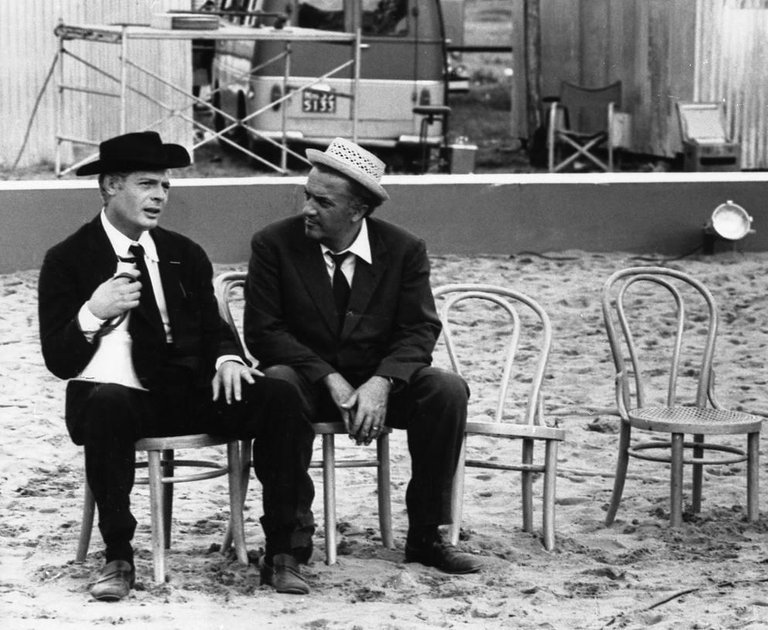
Y creo que allí reside la magia de esta historia y del talento del director italiano que obtuvo múltiples reconocimientos con esta cinta, incluido el Oscar a Mejor Película Extranjera. Una magia que ha intentado ser recreada, sin éxito: un musical de Broadway y una versión norteamericana basada en este musical (la película Nine que a pesar de contar con Daniel Day-Lewis, Marion Cotillard, Penélope Cruz, Kate Hudson, Nicole Kidman, Judi Dench, Fergie y Sophia Loren) no están ni cerca de la calidad de la historia original, sin duda una de las mejores películas de todos los tiempos.
